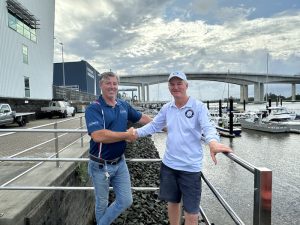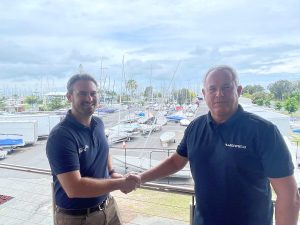‘Foolish’ business model led to collapse of tiny homes company that owes Australians millions, liquidator says

- by Admin
- August 16, 2024
In short:
A liquidator says the business My Tiny Home Kit had no real prospect of actually delivering homes and may have been trading while insolvent.
The company owes customers more than $3.4 million, according to initial estimates.
What’s next?
The liquidator says further investigation into the business is required. There is also an ongoing investigation by Consumer Affairs Victoria.
The liquidator of a tiny home business believes the company may have been trading insolvent for almost one year, saying the director had “no real prospect” of supplying the product he sold.
Menzies Advisory principal Michael Caspaney’s statutory report into Melbourne business My Tiny Home Kit was sent to creditors, including former employees and more than 130 customers, this week.
My Tiny Home Kit was founded in 2022 and promised customers affordable tiny homes as a solution to the housing crisis.
The company owes customers more than $3.4 million, according to initial estimates. Mr Caspaney says this amount is subject to further investigation.
The company may have been trading insolvent from at least July 2023, if not earlier, Mr Caspany wrote.
Mr Porter, 25, declared bankruptcy in June.
He said a detailed report would be required to determine the precise date of the company’s insolvency and what may be recoverable given Mr Porter’s status as a bankrupt.
Mr Caspaney found the company never recorded a profit.
“At no time did the company record a trading profit,” he wrote in his report.
“This is mainly due to the fact that virtually no revenue was recorded as being generated.”
He also said that it was unlikely any creditors would receive a dividend.
“I am not currently holding sufficient funds to distribute a dividend to creditors. At present, it appears unlikely that a dividend will be declared to any class of creditor.”
Mr Porter denies the liquidator’s initial findings that My Tiny Home Kit was trading while insolvent, and questioned the reported figure owed.
“I have always relied on professional advice to ensure our financial practices were sound,” Mr Porter said in a statement to 7.30.
“This figure does not reflect the refunds made by the company, which total over $500,000.”
He also disputes there are 130 creditors owed.
“I believe there are also a small number of creditors included in this figure that have never paid an invoice to any company under my directorship.”
‘It’s beyond imagining’
In May, 7.30 interviewed people who described the impact of being “ripped off” by Mr Porter — a self-described “visionary” who has been trying to make it big in business since he was 15.
7.30 spoke to one customer who paid more than $90,000 for a home he planned to live in. He has not received the product and has only been paid $19,000 of his requested refund.
A Sydney father, who paid more than $32,000 for a tiny home for his teenage daughter that never arrived, said: “It’s almost beyond imagining, losing that much money for nothing.”
My Tiny Home Kit went into liquidation a week after his last payment to the company.
“For people that have never owned a house before, and have provided their only savings to this company, it’s been devastating for them,” Mr Caspaney told 7.30, following the publication of his report to creditors.
Mr Porter denied the outcome was intentional.
“It was never our intention to leave our consumers in such a difficult position, and I wish we could have achieved a better outcome for everyone involved,” he said.
Business was ‘foolish’
Loading…
In his report, Mr Caspaney wrote that Mr Porter’s original business plan relied on the product being manufactured in China, but that Mr Porter had advised customers this was no longer possible after the onset of COVID-19.
Mr Porter persisted with plans to manufacture in Australia, a proposition that Mr Caspaney said was “never sustainable” given no one in the business had expertise in the area.
“In my view, sourcing ready-made product from China is a totally different equation to what I believe was a foolish assumption that similar product could be manufactured locally,” Mr Caspaney wrote.
“There is little to no evidence that any product of merchantable quality or fitness for purpose was ever manufactured by the company.
“Despite all of this, the company continued to accept deposits from customers at contract prices that were unachievable with no real prospect of manufacturing the product let alone supplying it.”
Rejecting the allegation his business model was “foolish”, Mr Porter said the “entrepreneurial” model “could have benefited from more senior advisory experience” and he was “committed to improving”.
Mr Porter’s business is subject to an ongoing investigation by Consumer Affairs Victoria.
He continued to accept deposits despite signing an Enforceable Undertaking in December 2023, but told 7.30 he did not accept payments knowing the business could not deliver.
The former director registered a new business with ASIC, AtCareNow, in April. A website — since-deleted — advertised NDIS services. 7.30 has confirmed neither AtCareNow nor Mr Porter are registered with the NDIS Commission.
“AtCareNow was merely a business concept and did not involve any trading, sales, or financial transactions,” Mr Porter said in a statement to 7.30.
Bank transactions days before liquidator’s access
Mr Caspaney also wrote that his audit had found “literally hundreds” of amendments to the company’s accounting software in the days leading to him being granted access to the books.
“Most of the amendments were payments transactions made to the director’s own bank accounts,” Mr Caspaney wrote.
“Most of the amendments were allocated to ‘sundry expenses’ or ‘advertising expenses’. It appears they may have been posted to those accounts after they were initially posted to the director’s loan account.”
If the amendments were reversed, Mr Porter could owe the company “a substantial sum”, Mr Caspaney wrote, but said further investigation was needed.
“It is my view that until bank statements for all dates up to my appointment are obtained, I cannot provide the ASIC with definitive evidence of what I believe could be various forms of misconduct by the director and possibly his advisors,” he wrote.
Mr Porter said a “registered accountant” managed these transactions and denies any allegation of financial misconduct.
Watch 7.30, Mondays to Thursdays 7:30pm on ABC iview and ABC TV
The Latest News
-
December 26, 2024LIVE Boxing Day Test: Khawaja sent packing in shock wicket; Konstas knock a highlight
-
December 26, 2024Cricket: Australia’s Kostas gets better of India on debut
-
December 26, 2024Sam Konstas dazzles in Boxing Day Test debut. – Colitco
-
December 26, 2024Sam Konstas in epic response to MCG heroics amid wild Jasprit Bumrah detail
-
December 26, 2024Virat Kohli facing sanction after Sam Konstas fireworks rattle India in Boxing Day Test



